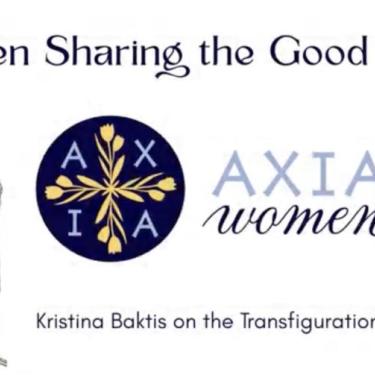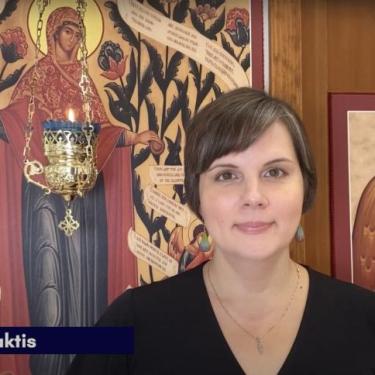
Blessed Feast of the Transfiguration for those who celebrate today! We had a wonderful four weeks meditating on this Feast with Orthodox women across jurisdictions as part of our “Women Sharing the Good News: Teaching and Preaching” mini-course which concluded last week! Over the next couple of weeks, we’ll be sharing a selection of sermons with you, starting with this rich and beautiful meditation by Kristina Baktis. You can also watch her give this sermon on our Youtube channel here!
As a child, Transfiguration was one of my favorite feast days because we blessed fruit. I loved the rituals around the feast. I would go with my mom to the grocery store and pick out the fruit for our basket. Plums were my favorite. Then, the anticipation that I couldn’t eat this special fruit until it was blessed after church. Once I ate the plum, I would have to wrap the pit in a napkin so I could bury it in the backyard when I got home. My grandma and mom would explain that we take special care with things that are blessed. The whole fruit, even the part that we can’t eat, is holy, good, special. We would bury the pits, peels, and cores in the garden where they would break down, add nutrients to the soil, and help the flowers grow. For most of my life, I was so focused on the fruit that I didn’t pay attention to the story of the Transfiguration and what we were actually celebrating.
So, what are we celebrating on this feast? Christ took three of his disciples up to the top of a mountain. Moses and Elijah appeared, and Christ revealed His Glory. The disciples write that His face shone like the sun, and His garments were brighter than any launderer on earth could render. God the Father spoke from a cloud, “This is My beloved Son. Hear Him.” The disciples are afraid, and suddenly everything goes back to normal. As the disciples are going down the mountain with Christ, He tells them not to talk about what they experienced until after His resurrection. What does this story have to do with fruit? It seems like it would be more fitting to bless candles and light bulbs on this feast.
I think we can find an explanation in the word revealed. Christ didn’t transform into this bright light; He revealed it. This light was there. This light is there. The disciples just didn’t have the eyes to see it before. The glory that was revealed to the disciples is not limited to Christ. It exists in all of God’s creation. This is one reason why the fruit is relevant. The priest doesn’t bless fruit on Transfiguration to make the fruit holy, good, special. He blesses it to remind us that this fruit, and all of God’s creation, is holy, good, special. We just don’t always have the eyes to see it.
After the disciples see Christ’s glory, they are told to hear Him. It’s not enough for us to see that all of God’s creation is holy, good, special. We also must have the ears to hear God’s instructions on what to do with that knowledge.
Transfiguration 2006 was the first year I didn’t have my basket of fruit. At that time, most of my rituals revolved around my alcohol addiction, leaving little time for anything else. And I was just grateful that I made it to church that morning. During the liturgy, I got in the communion line and listened to the choir sing hymns for the feast. I wondered if today would be the day that, like St. Mary of Egypt, an invisible force field would keep me from communion. Would it take a supernatural vision of God to get me to finally accept my addiction and seek help? And then very softly I heard, “This is My beloved Son. Hear Him.”
I didn’t need to experience a vision of God in a cloud, a force field, or a burning bush. I knew that my addiction was slowly cutting me off from communion with God because my entire life, I had been taught how to take care of things that are holy, good, special. I was using addiction as an attempt to throw out my pain, like a plum pit. Instead, I needed to treat that part of me with care. I needed to give my pain to God so that it could be broken down into something to feed my spiritual growth. That Transfiguration Sunday, Christ revealed to me that He had always been there with me, guiding me, helping me. I only had to hear Him and allow myself to be changed.
In the Orthodox Church, we don’t commemorate past events; we participate in their reality today. On Transfiguration, we are called to experience God’s eternal glory. When we sing the Troparian, we are not just singing about God revealing Himself to the disciples as much as they could bear it. We are stating that God is, TODAY, revealing Himself to us as much as we can bear it. Hopefully, we are able to bear a little more of His Glory than last time we celebrated the feast.
My sisters in Christ, what is Christ revealing to us this year? Can we see Christ’s image in the coworker we struggle with? Can we let go of negative thoughts that prevent us from seeing God working in our lives? Are we taking care of the resources God has entrusted to us? What behavior hinders us from bringing Christ’s healing presence to ourselves and our community?
When we leave liturgy today, and walk out of church with our baskets of blessed fruits, may we also carry the revelation that all of God’s creation is holy, good, special. And may we bear the fruits of His love into this world. Amen.



